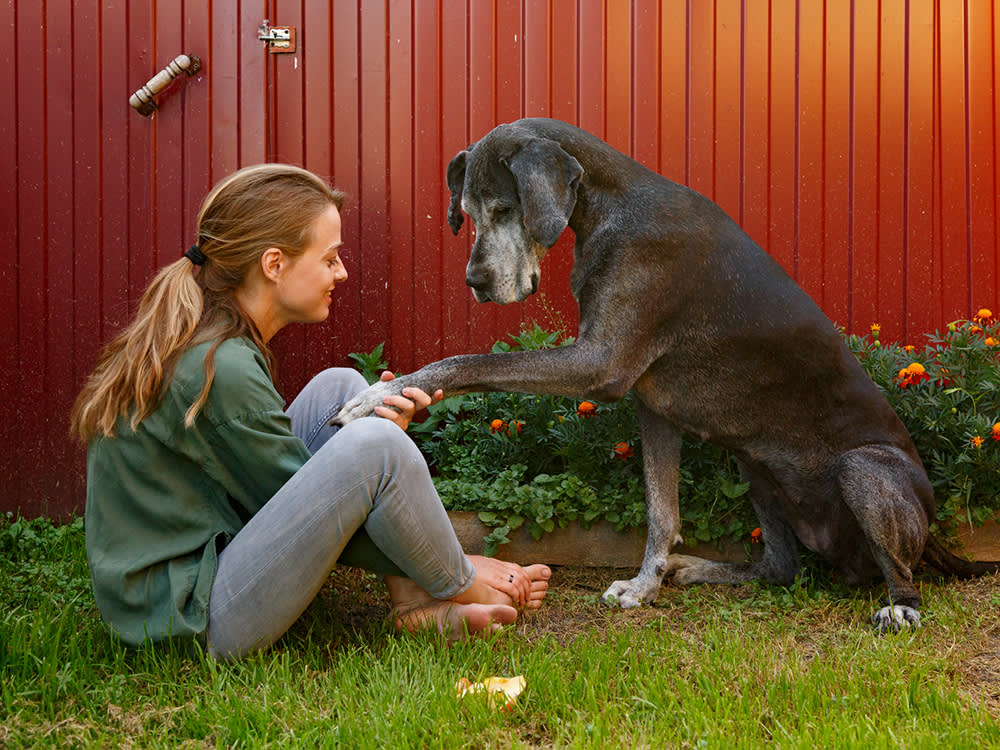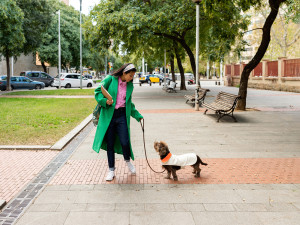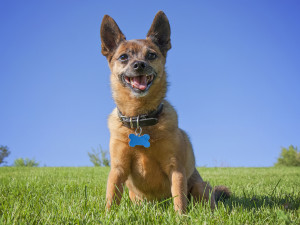A Dog by Any Other Name
The science and art of naming your dog — sometimes, what you say is what you get.

Share Article
A dog’s name isn’t just a label. It’s a character trait, a marker of personality, and can sneakily impact how you see your pal and, in turn, your relationship with them. With a track record of 13 bites, ‘Baby’ was less of a cuddly infant and more of a one-dog demolition crew. Yet, his pet parents treat him like a cuddly bundle of joy, unaware of how Baby’s name shaped the dynamics of their relationship. Wondering what some of the worst dog names are? Learn about a few naming faux-paws and how to avoid them.
Why Are Dog Names Important?
Names are important, so important that Vicki Hearne wrote an entire book — Adam’s Task — about the weight of words in our relationship with dogs. What we call our dogs has meaningopens in a new tab, and can have important consequences, both for ourselves and for our dogs.

littleKin™ is Kinship’s home just for puppy and kitten parents. Bop over to check out expert advice, new pet tools, and special deals—all curated for your newest family member.
opens in a new tabUnconscious bias
One of the reasons that names are so important is the effect they have on us when we say them. Calling a male dog “Baby” makes it difficult to think of him as an adult dog, and makes it easy to excuse his behavior — it gives him “puppy privileges” that should’ve expired long ago.
Emotions evoked by a name can have a profound effect even if you’re not conscious of it. Much of our behavior is driven by the unconscious — just look at the research of psychologist John Bargh, who found that people walk more slowly if you ask them to play word games with phrases that include indicators of age (like the words “wrinkled” and “bingo”). Believe it or not, if you’re named Georgia, you are more likely to move to the state of Georgia than you are to the state of Virginia, and vice versa.
Cause for panic
Labeling a Rottweiler “Brute” (as did one of my clients) does little to convince the neighborhood that your 85-pound Rottie plays well with Yorkies. Names evoke emotions in us, and those emotions influence our behavior. Since our behavior influences the behavioropens in a new tab of our dogs and others around us, a name — all by itself — can have a surprising amount of power.
A dog named Bear, at a campground could cause panic to camp goers when shouted. And as Karen London PhD wrote, “I often wonder about dogs named Killer, and those named Gunner who end up with the nickname Gun. These names could all cause issues when yelled out in a variety of contexts.”
Worst Dog Names
Here are some of the worst dog names to avoid. Potentially behaviorally inappropriate dog names include Baby, Angel, Princess, Precious, and Sweetie. Other bad choices for dog names include aggressive names, long names, offensive names, and scary names.
Bad dog names
Danger
Killer
Fire
Help
Thief
Bomb
Picking Good Dog Names
Your dog’s name has another and more direct effect on their behavior. The structure of a sound — whether it consists of soft vowels or hard consonants, for example — has an influence on how your dog responds. Most of us say our dogs’ names because we want their attention; that is, after all, the way we use names in human communication. No matter who it is spoken to, dog or person, “Margaret” means: “Margaret, please pay attentionopens in a new tab to me at this moment. I would like to communicate with you.”
Hard sounds
Different types of sounds vary in their ability to get your dog’s attention. If you analyze the acoustics of spoken languageopens in a new tab, you’ll find that saying hard consonants, such as “k,” “p” and “d,” create what are called “broad-band” sounds, with lots of energy across a range of frequencies.
If you were looking at a picture of the word “Kip,” you’d see a vertical spike (the broad band) for the “k” and another for the “p.” Those types of sounds are good at capturing your dog’s attention because they stimulate more acoustic receptor neurons in the brain than do the flatter sounds made by vowels and soft consonants. (That’s one of the reasons that clickers work so well — lots of broad-band sound.) So, if you want your dog’s attention, you’re more likely to get it if she’s named Kip rather than Gwen. Of course, you can train a dogopens in a new tab to pay attention to any sound at all if you condition them well enough, so if you want to name your dog Gwen, go right ahead.
Short names
Short names with lots of hard consonants are great for people working dogs in fast-action events, such as agilityopens in a new tab and herdingopens in a new tab. The value of a short name is obvious: speed (you don’t want to be singing “Gwennnn-de-lynnnnn��” when you’ve got a tenth of a second to get a response out of your dog) and focus (the consonants at either end of a name like Kip help you keep your dog’s attention).
Two-syllable names
Perhaps the handiest names are the ones with a lot of flexibility. I must add that there’s something satisfying about a two-syllable name; “Pixie,” “Tulip” and “Rollo” all flow off the tongue in a way that just feels good. I’ve also wondered if, in some cases, two-syllable names can actually help get a dog’s attention, in that the first syllable acts almost as a primer for the second.
There are several facets of a dog’s name that bear consideration. It’s good to be aware of all the ways a name can affect your dog’s behavior, but nonetheless, a dog by any other name … will still roll in cow pies.

Patricia McConnell, PhD
Patricia McConnell, PhD, is an animal behaviorist and ethologist and an adjunct associate professor in zoology at the University of Wisconsin, Madison, as well as the author of numerous books on behavior and training.
Related articles
![Woman wears bright blue jacket and walks her black dog.]() opens in a new tab
opens in a new tabWhat Your Dog’s Outfit Says About You
Street-style photographer Johnny Cirillo on the rise of puppy peacocking.
![profile portrait of grumpy a ginger dog, inside on a golden retro velvet armchair]() opens in a new tab
opens in a new tabYour Grumpy Dog Is Very Smart—Science Says So
This study found that cranky pups are actually very fast social learners.
![Short-haired blonde woman in a tan sweater and blue jeans sitting on a bench talking to her Beagle mix dog who is looking up at her]() opens in a new tab
opens in a new tabHow You Say Something to Your Dog Matters More Than What You Say
TikTok pet parents have made this clear: Tone matters. Celebrity dog trainer Nicole Ellis says dogs can hear “stress in our voice — whether directed at them or when they hear us talking to others.”




